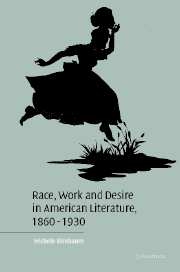Book contents
- Frontmatter
- Contents
- List of illustrations
- Acknowledgments
- Introduction: working relations and racial desire
- 1 Dressing down the First Lady: Elizabeth Keckley's Behind The Scenes, Or Thirty Years A Slave And Four Years In The White House
- 2 Off-color patients in Frances E. W. Harper's Iola Leroy and W. D. Howells's An Imperative Duty
- 3 “Alien hands” in Kate Chopin's The Awakening
- 4 “For blood that is not yours”: Langston Hughes and the art of patronage
- Epilogue: “co-workers in the kingdom of culture”
- Notes
- Index
3 - “Alien hands” in Kate Chopin's The Awakening
Published online by Cambridge University Press: 07 December 2009
- Frontmatter
- Contents
- List of illustrations
- Acknowledgments
- Introduction: working relations and racial desire
- 1 Dressing down the First Lady: Elizabeth Keckley's Behind The Scenes, Or Thirty Years A Slave And Four Years In The White House
- 2 Off-color patients in Frances E. W. Harper's Iola Leroy and W. D. Howells's An Imperative Duty
- 3 “Alien hands” in Kate Chopin's The Awakening
- 4 “For blood that is not yours”: Langston Hughes and the art of patronage
- Epilogue: “co-workers in the kingdom of culture”
- Notes
- Index
Summary
What intellectual feats had to be performed by the author or his critic to erase me from a society seething with my presence …?
Toni Morrison“All along the white beach, up and down, there was no living thing in sight.”
Kate Chopin[T]he real challenge … is to make whiteness visible as a culturally constructed ethnic identity historically contingent upon the disavowal and violent denial of difference.
Kobena MercerIf in Howells's and Harper's fiction doctors successfully arbitrate racial and gender maladies, in Kate Chopin's The Awakening (1899) Edna Pontellier's Dr. Mandelet is unable to either correctly diagnose or treat her “morbid condition.” Her white Creole husband thinks the fact that she is “not like herself” (117) has something vaguely to do with the “eternal rights of women” (118) even though she is not associating with what the doctor refers to as that circle of “pseudo-intellectual women” (118). Because she “lets the housekeeping go to the dickens” (117), finds weddings “one of the most lamentable spectacles on earth,” and refuses him in bed (“you understand – we meet in the morning at the breakfast table” [118]), Mr. Pontellier thinks the problem is generally of a gynecological nature. The “semi-retired physician,” most often sought for consultation for his “wisdom” than for his “skills” (116–17) concurs.
- Type
- Chapter
- Information
- Race, Work, and Desire in American Literature, 1860–1930 , pp. 76 - 93Publisher: Cambridge University PressPrint publication year: 2003



